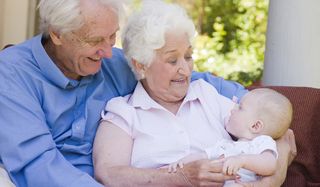Kids Safer with Grandparents Behind the Wheel

Kids are safer in car accidents when their grandparents drive than when their parents drive, a new study suggests.
Researchers from Philadelphia looked at 1,302 crashes involving children 15 years old or younger from 2003 to 2007.
The risk of significant injury to children driven by grandparents was half that of parents.
Further, grandparents drove their grandchildren in 9.5 percent of the accidents, but those accidents accounted for only 6.6 percent of the total injuries.
The news comes despite the study also finding that grandparents were less likely to use proper child restraints.
That's concerning because "grandparents are a group who are involved in childcare activities at an increasing level," said study co-author Fred Henretig, an emergency department staff physician at Children's Hospital of Philadelphia.
The study will be published in the August issue of the journal Pediatrics.
Sign up for the Live Science daily newsletter now
Get the world’s most fascinating discoveries delivered straight to your inbox.
Older drivers and crashes
Henretig was surprised by the findings. "My original hypothesis was that the injury rate is higher for grandparent drivers," he said.
Indeed, older drivers have an increased risk of being in car accidents, studies show. The increased risk begins at 55 years, but is especially pronounced after 65 years, Henretig said. The median age of grandparent drivers in the new study was 58 years old, while the median age of parents was 36 years old.
Researchers used insurance claims and telephone interviews to collect the data, and calculated the risk of significant injury to children after adjusting for child, driver, vehicle and crash characteristics.
The researchers considered the injury "significant" if the child suffered a concussion or more serious brain injury, an injury to an internal organ, an injury to his or her spinal cord or a fracture of an extremity.
Of 2,454 total injuries reported in the study, grandparents were driving when 161 injuries occurred, and parents were driving when 2,293 injuries happened.
Grandparent driver used "optimal restraint" to keep children safe 72.5 percent of the time, while parents did so 79.3 percent of the time. Children were unrestrained 2 percent of the time with grandparents and 1.3 percent of the time with parents.
Grandparents and "precious cargo"
The surprising results might be attributed to grandparents who are especially cautious with this "precious cargo," Henretig said.
"I became a grandparent myself about three years ago," he told MyHealthNewsDaily. "My wife and I found that it's challenging and a little scary. The occasional responsibility to drive… is a little nerve racking."
Henretig said he guessed that grandparents are more focused on the task of driving and are "probably driving a little more slowly and keeping a little further distance from the car in front of them" along with other safe driving practices.
It could also be that grandparents drive with less urgency, or that they drive on back roads instead of on freeways, he said.
The study shows promise, but some questions remain, said Bruce Simons-Morton, chief of the Prevention Research Branch at the National Institute of Child Health and Human Development.
"The conclusion is perhaps overstated," Simons-Morton said. "In studies like this, it's difficult to control for factors that are important."
Those factors include the speed of the vehicle and the type of road, he said. "If you're a parent, you're probably going to let grandma and grandpa take your child on an easy trip."
Crash rates are much higher for teenage drivers and drivers over 75, Simons-Morton said. Because the median grandparent age was 58 in this study, "you would expect relatively safe driving," he said.
David Mooney, trauma medical director at Boston Children's Hospital, praised the study, but agreed that older grandparents probably aren't safer drivers. "There is a little bit of selection bias because, are you really going to let your 80-year-old grandmother drive your kid around?" he said.
More research is needed to find out why child injury rates are so much lower when grandparents are driving, Henretig said. "If you could learn from the grandparents what they're doing right and teach that, especially to the parents, that would have a huge public health impact," he said.
There's also the potential to lower the injury rate by teaching grandparents how to properly restrain children in vehicles, he said.
Pass it on: Children involved in car crashes suffer fewer significant injuries when their grandparents drive than when their parents drive. Grandparents could be even safer if they used proper child restraint techniques.
This story was provided by MyHealthNewsDaily, sister site to LiveScience.
Most Popular

